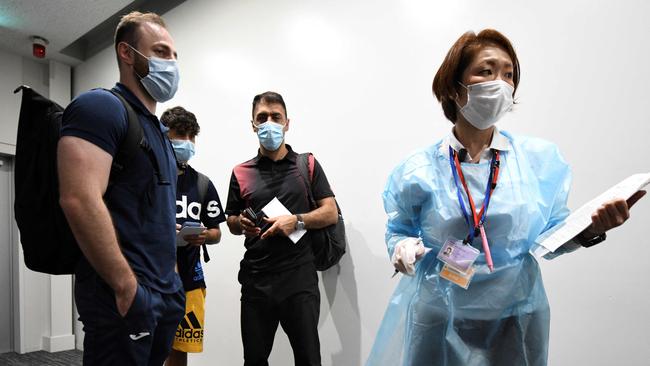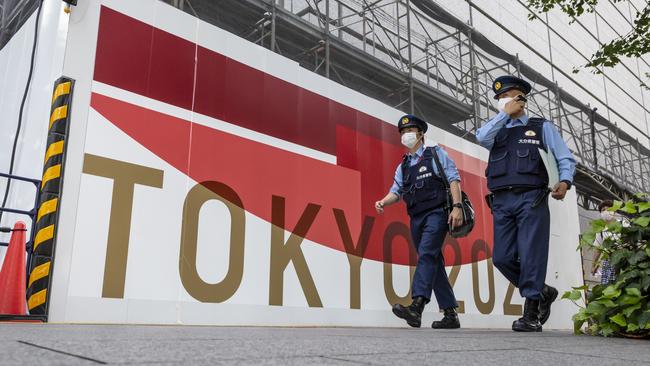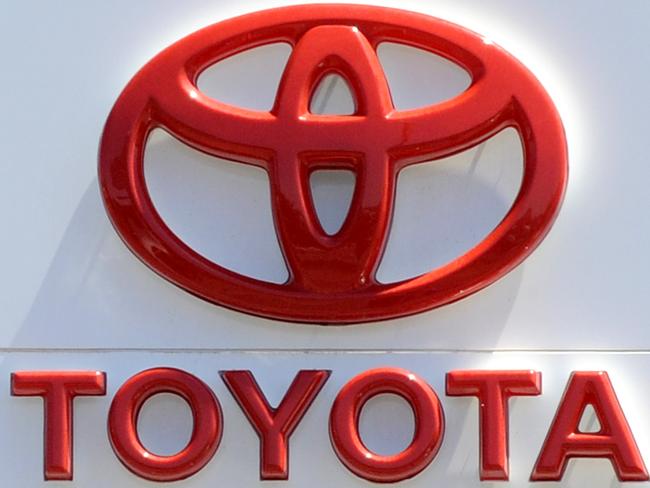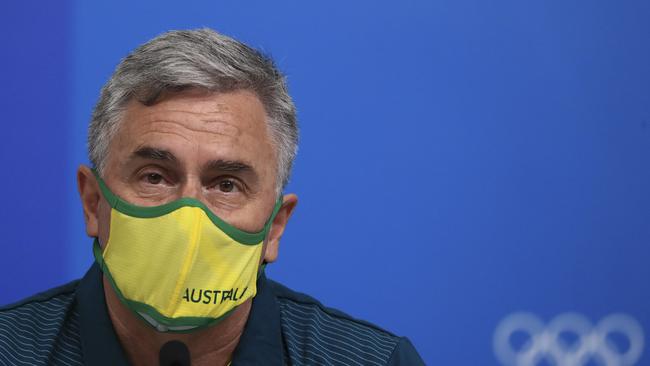Tokyo Olympics 2020: Olympic hypocrisy called out after reporter ‘locked up’
There are now almost 80 Games-related Covid-19 cases in Tokyo with a taekwondo athlete has been forced to withdraw from the Olympics as a result.

Olympics
Don't miss out on the headlines from Olympics. Followed categories will be added to My News.
A Chilean taekwondo competitor has become the latest athlete to withdraw from the Tokyo Olympics after testing positive for Covid-19, officials said.
Fernanda Aguirre had travelled to Japan from Uzbekistan, where she had been preparing for the Games, but tested positive on arrival.
“(She) is asymptomatic and in good health, but unfortunately will not be able to compete because the Japanese authorities impose a 10-day quarantine,” a Chilean Olympic committee statement said on Tuesday.
Aguirre has been moved to an isolation facility, as has her coach. The 21-year-old, who won a bronze medal at the 2019 Pan American Games, said on social media she was “destroyed and very sad”.
There have been 79 Games-related coronavirus cases so far at the Olympics.
OLYMPIC HYPOCRISY CALLED OUT AFTER REPORTER ‘LOCKED UP’
A journalist who is being forced to undertake a 14 day hotel room quarantine in Tokyo has called out the double standards between media and athletes from Games organisers.
BBC reporter Chris McLaughlin and members of the BBC Scotland team flew into Tokyo on the same plane as six Team Great Brittan athletes and two officials who had been identified as close contacts to a positive Covid case.
Despite completing a number of negative tests, the media members must remain in their hotel rooms for 14 days as part of the quarantine process.
McLaughlin said athletes on the same flight did not have to undertake the same isolation measures.
“Hugely frustrated that BBC Scotland team here in Tokyo identified as close contacts to a Covid case on flight over,” he posted on Twitter.
“Rules say self isolate in hotel room for 14 days. Numerous PCR tests negative. Athletes on same flight also identified but rules say they don’t isolate.”
Hugely frustrated that BBC Scotland team here in Tokyo identified as close contacts to a Covid case on flight over. Rules say self isolate in hotel room for 14 days. Numerous PCR tests negative. Athletes on same flight also identified but rules say they don’t isolate. #Tokyo2020
— Chris McLaughlin (@BBCchrismclaug) July 20, 2021
McLaughlin received support for his stance on Twitter from fellow reporters.
.@Tokyo2020 olympic lock up double vax, negative tested @pbarkersport@BBCchrismclaug and @bbcscot journalists for 2 weeks after a covid passenger is on their flight. But athletes,entourages same flight allowed out.
— Jacquelin Magnay (@jacquelinmagnay) July 20, 2021
In an article on the BBC, McLaughlin went into more detail about the moment he discovered his Olympics would be spent inside a hotel room.
“Suddenly the walls, in my already small room, started to close in,” he wrote.
“All the conversations we’d had that day about where we would film and what interviews we had planned started to feel irrelevant.
“Over the next few hours it was confirmed we would be confined to our rooms for 14 days, starting on the day we arrived in the country.
“My heart absolutely sank and in all honesty, some panic set in about how I would cope.
“How would I get food? Could we exercise? Strictly in our room? A year’s preparation gone in a 45-second phone call.”
There have been 67 cases of Covid-19 infections in Japan among those accredited for the Games since July 1, when many athletes and officials started arriving.
PHENOMENAL COST BLOWOUT OF THE TOKYO OLYMPICS
The Tokyo Games will be the most expensive on record with the year-long Covid-19 delay pushing costs out well above $20 billion.
The Games have been hit with rising construction costs, the need to build temporary venues, and other logistical headaches caused by the delay of the Games.
A further blow came just two weeks ago when organisers decided the risk of a Covid-19 outbreak was too great to allow spectators to attend events in Tokyo. Tickets sales had been expected to generate $1 billion for organisers, but will now bring in just a fraction of that, with some spectators allowed to attend events at venues outside Tokyo.

Tokyo had initially claimed the costs would be the equivalent of around AUS $10 billion at today’s conversion rates when they won the bid in 2013.
But in December, organisers said the estimated cost would now be US $15.4b – about $20 billion in Australian currency.
The postponement costs have risen to about $4 billion.
Sponsorship has also proved problematic. While sponsors have forked out around $4 billion, the decision to hold the Games in Japan has proved so unpopular with locals that one of the major sponsors, Toyota, has pulled its Games-related advertising, featuring local athlete, from the airwaves in Japan.

Tokyo 2020 has declined to comment on precisely what the budget blowout is, saying it had never confirmed numbers published in local media.
Oxford University in the UK published a report last year which found the Tokyo Games were already the most expensive summer Games on record, even before final delay costs were factored in.
TOKYO DAILY! Welcome to our new Olympic Games podcast. Matty Johns and Bryan Fletcher give us the lowdown on one of the world’s great cities that will host this year’s Olympic Games.
Oxford scholar and economist Bent Flyvbjerg told the Associated Press in September that the cost overrun at that point was already more than 200 per cent.
His study did not include other taxpayer funded costs such as improving roads and streetscapes, as most host cities did ahead of hosting an Olympic Games.
Mystery surrounds three Olympic Covid cases
Australia has no idea where the three athletes who have tested positive for Covid-19 in the Olympic Village are isolating, chef de mission Ian Chesterman said.
Two South African footballers and a Czech beach volleyballer are in isolation in their rooms after testing positive in recent days at the high-rise athletes’ village in Tokyo.
But Chesterman said Australia was not planning any changes to its Covid-safe protocols, which already required Australian athletes to keep their distance from other countries’ athletes and officials within the village.
“Obviously the village is a pretty compact village, it’s really a great village because it is compact,’’ he said.
“We are all located in high-rise buildings, well-spaced.
“We do have the South African team in a building near us but also even within the South African team they will have athletes in different places.
“We are not aware that the athletes involved in any particular sport are in any particular building.’’
Twenty-one South African football players have now been deemed close contact of their infected teammates, but Chesterman said football teams had their own buildings, and many were located all over Japan.
“We have no idea at the moment where any of the positive tests are because there’s a range of possibilities as to where they could be,’’ he said.
The Japan Government is tracking the movements of the 90,000 Olympic Games-related visitors who are arriving into the country via GPS on their smart phones, so the exact location of the players and others who had been in close proximity would be known to health officials.

Local media reports say 67 Games-related people have now tested positive to COVID-19, including the three athletes in the village, and another US gymnast who is not housed in the village.
Chesterman said Australian athletes just needed to stick to their Covid-safe protocols, with regular handwashing, daily testing, mask-wearing, and keeping social distance from other countries athletes and officials.
“The athletes are really calm. They’ve been well prepared for the fact that there is most likely going to be a Covid case within the village, and the protocols that we’ve put in place are designed to keep them safe,’’ he said.
“So it’s just a matter of sticking to these processes which will get us through these Games hopefully in a situation where we get every athlete through their campaign and home safe and well,’’ he said.
Infectious disease expert and former WHO member who is now working on Japan’s vaccination program, Kenji Shibuya, made headlines in Japan on Tuesday when he said the infections in the village showed the “that the bubble system is kind of broken.’’
“My biggest concern is, of course, there will be a cluster of infections in the village or some of the accommodation and interaction with local people,’’ he said.
Australian medical director Dr David Hughes said the Aussies athletes could feel safe going into their competitions, as they were “as close to fully vaccinated as you can get’’ and 80 per cent of people in the village also vaccinated.
More Coverage
Originally published as Tokyo Olympics 2020: Olympic hypocrisy called out after reporter ‘locked up’




